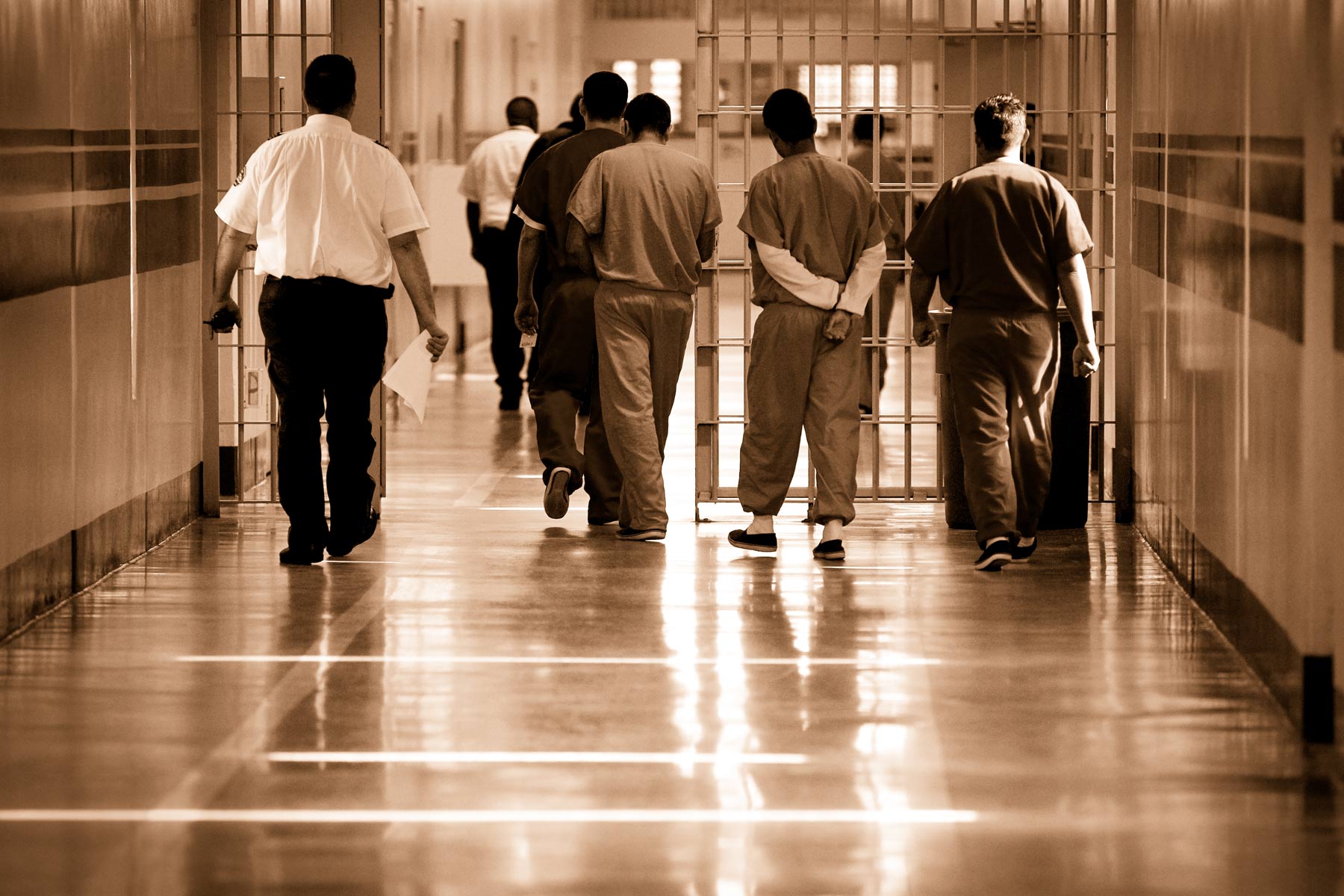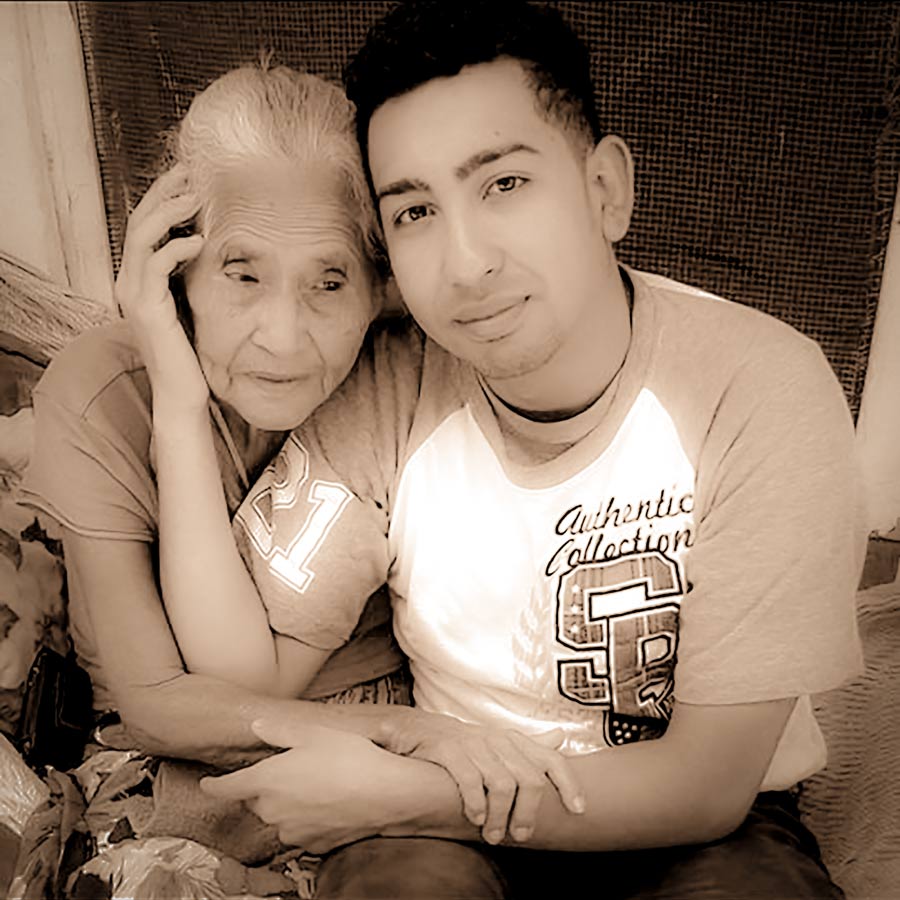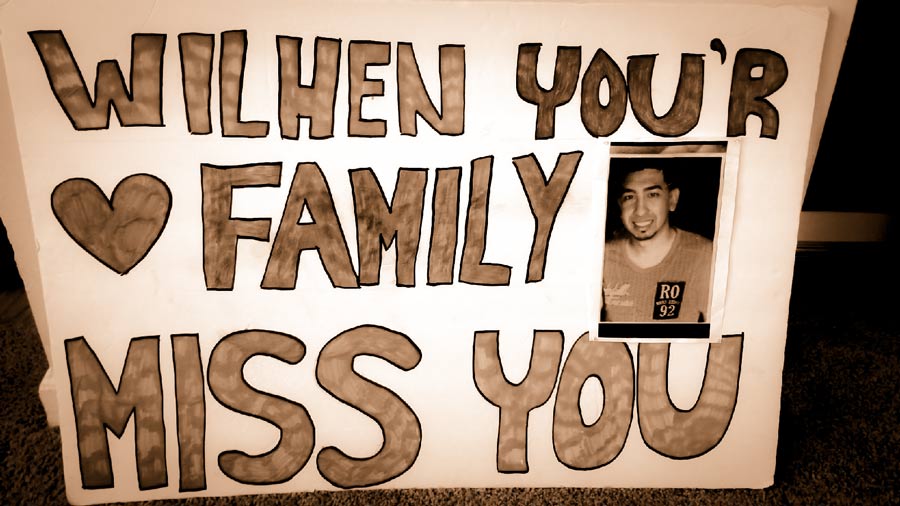Investigation: Corporations Are Profiting From Immigrant Detainees’ Labor. Some Say It’s Slavery.
At privately run detention centers, immigrants say they’re forced to work for $1 a day.
Victoria Law

PRESIDENT DONALD TRUMP VOWED IN MARCH, “My administration will focus on ending the absolutely horrific practice of human trafficking. And I am prepared to bring the full force and weight of our government, whatever we can do, in order to solve this horrific problem.”
Trump is using this specter of human trafficking to justify beefed-up border walls and a vicious crackdown on immigrants. Experts say his cure has nothing to do with the disease.
“It’s a fantasy, what the president is promising,” says Guadalupe Correa-Cabrera, an associate professor at George Mason University who studies trafficking in Mexico and Central America. “People will still come, escaping poverty and violence. Trafficking happens when they are forced to work along the route—drug smuggling, sex work. By increasing border enforcement, you’re just making the journey more expensive and longer, and making people more vulnerable to traffickers.”
But some people caught in this sweep say that the federal crackdown itself subjects them to another, pernicious form of trafficking. They say the corporations that operate immigrant detention facilities illegally force detainees to work. There’s reason to believe thousands of the roughly 35,000 people in immigrant detention are currently being coerced into labor.
Under federal law, human trafficking is defined as subjection to involuntary labor through “force, fraud or coercion.” Within the past year, four lawsuits have been filed by seven people who say they were victims of trafficking at the hands of the nation’s two largest private detention center operators: CoreCivic and GEO Group. The suits charge that at five CoreCivic facilities and one GEO Group facility, the corporations violated the federal Trafficking Victims Protection Act by threatening solitary confinement or withholding basic necessities, such as food, toilet paper and soap, if detainees refused to work. According to the lawsuits, the companies did so to reduce labor costs and maximize profits.
The four new suits join one already wending its way through the court system. Filed in 2014 against GEO Group, the suit was certified as a class action this February. Approximately 62,000 people currently or previously detained in a GEO Group facility in Colorado might have been affected.
Each of these five lawsuits concerns the Voluntary Work Program, a U.S. Immigration and Customs Enforcement (ICE) program that puts detainees to work for $1 a day.
“The name ‘Voluntary Work Program’ is misleading since, in most cases, it actually means forced labor,” says Liz Martinez, director of advocacy and strategic communications at Freedom for Immigrants, a nonprofit working to abolish immigrant detention. Noting that detained people are wholly dependent upon detention staff for basics such as food, toilet paper and even time outside, “the detention facilities create an inhospitable atmosphere that incentivizes people to join these Voluntary Work Programs,” she explains.
Asked about the size of the Voluntary Work Program, ICE spokesperson Danielle Bennett wrote, “Voluntary Work Programs currently exist at the five government-owned Service Processing Centers (SPCs) and at over 25 privately run facilities.” Bennett would not clarify what “over 25” meant. A 2014 New York Times investigation by Ian Urbina found that 55 U.S. detention centers had Voluntary Work Programs, 34 of which were run by private corporations.
Though only privately run detention centers have been named in the lawsuits, advocates don’t rule out the existence of forced labor in government-run facilities. “In county jails and other public facilities, they’re also put to work,” says Martinez. Not all of that labor falls under the Voluntary Work Program. Urbina found that Butler County Jail in Ohio, for instance, is not a formal participant, but approximately 50 of the 300 immigrants detained under the jail’s contract with ICE clean and perform maintenance. A county representative told Urbina that utilizing unpaid immigrant labor means the jail does not need to hire outside janitorial workers, saving the county hundreds of thousands of dollars each year.
However, lawsuits have targeted privately run detention centers because of the number of reported violations, as well as the outrage surrounding the fact that corporations and shareholders are profiting from this labor.

Martha Gonzalez says she was coerced to work by CoreCivic. (Photo by Andre Brooks)
WORKING FOR $1 A DAY AND SANITARY NAPKINS
Martha Gonzalez was already a trafficking survivor. Fleeing an abusive relationship in Mexico, she hired coyotes to bring her and her daughter across the border, and was forced into sex work after the coyotes threatened them with violence.
In October 2017, after 14 months in ICE custody, Gonzalez was released and issued a T-1 visa, reserved for trafficking victims. Now, she is demanding restitution from CoreCivic. In February, she sued the company for labor trafficking.
Gonzalez spent those 14 months being shuttled through three of CoreCivic’s Texas detention centers, in La Salle County, Hutto and Laredo. At both Hutto and Laredo, she says, prison officials verbally abused detainees, threatened them with solitary confinement and deprived them of basic necessities in order to coerce them into working seven days a week. For instance, Gonzalez tells In These Times, if she tried to take a day off, detention center staff refused her toothpaste and other essentials. When she was menstruating, they limited her sanitary napkins to two per day unless she worked.
5,532:
DAILY POPULATION IN U.S. IMMIGRANT DETENTION CENTERS IN 1994
39,322:
DAILY POPULATION IN U.S. IMMIGRANT DETENTION CENTERS IN 2017
Though the suit doesn’t specify how many others were allegedly threatened into working, Gonzalez says she wasn’t the only one who suffered retaliation for refusing to work. She also alleges that the paltry wages sometimes went unpaid, thus depriving her of the means to stay in touch with her family. In 2016, she filed a formal complaint about not being paid for some of the days she had worked. In retaliation, she says, staff didn’t allow her to work at all. Without that $1 a day, Gonzalez could not afford phone cards to call her daughter and mother. Calls from CoreCivic’s Texas detention centers typically cost 50 cents per minute.
Gonzalez and her attorney are seeking class-action status on behalf of every detainee who worked for no pay or $1 or $2 per day at any CoreCivic detention facility from February 2007 onward. It’s not yet known how many people could become part of this lawsuit if the court agrees, but her complaint estimates the number to be in the thousands or tens of thousands. Gonzalez wants the court to force CoreCivic to stop the practice. She and her attorney are also seeking minimum wage payments for labor performed while detained.

LET US VOLUNTEER YOU
The Voluntary Work Program dates back to 1950. Its $1 a day rate has yet to be adjusted for inflation (and would be equivalent to $10.40 a day now). In 2013, the 55 detention centers where the program operated held 76 percent of the country’s detained immigrants. The New York Times estimated that at least 60,000 detained immigrants who cycled through the nation’s detention centers over the course of a year participated in the program. That estimate includes only the people who are paid $1 a day—not those who work in exchange for additional food, phone calls or time outside their cell.
In some facilities, the $1-a-day wages have sparked mass hunger strikes and other protests. Detainees at the Northwest Detention Center in Tacoma, Wash., rose up en masse in defiance against the program in 2014, 2017 and 2018. Lawsuits over the program’s labor practices go as far back as 1990, when 16 detained immigrants charged the immigration agency (then known as the Immigration and Naturalization Service, or INS) with violating the Fair Labor Standards Act. In that case, however, the courts ruled that detained immigrants are not considered employees and are not protected by labor law. In September 2017, Chao Chen, who had been detained in Washington state, filed suit against GEO Group charging the corporation with violating the state’s minimum wage law. In December 2017, a judge denied the corporation’s attempts to have the lawsuit dismissed. Chen’s lawyer is now seeking class action status.
What is new, however, is the legal strategy of charging corporations with labor trafficking. According to ICE’s own handbook, this work is not compulsory and provides “opportunities to work and earn money while confined.” But—according to every one of these five lawsuits—those who refuse to work, attempt to take a day off or complain about hazardous work conditions are severely punished.

Wilhen Hill Barrientos with his aunt. He is suing CoreCivic for forced labor. (Photo courtesy of the Barrientos family)
This new legal approach is important as the Trump administration increases—and fills—the number of detention beds. In 2012, Congress approved an act mandating that ICE maintain a daily minimum of 34,000 detention beds. In May 2017, Congress provided ICE with an additional $2.6 billion to increase the beds by another 5,300. In 2017, an average of 39,322 people were in immigrant detention each day, a huge jump from 5,532 in 1994. Private corporations control over 60 percent of immigrant detention beds.
43%
INCREASE IN ICE ARRESTS UNDER TRUMP ADMINISTRATION
Not only have these corporations benefited from these policies and laws, but they’ve spent tens of millions of dollars to shape and push state and federal policies resulting in more detention beds. CoreCivic (then called the Corrections Corporation of America) worked with the American Legislative Exchange Council to shape Arizona’s draconian 2010 anti-immigrant law, SB 1070, according to a previous In These Times investigation. The groups routinely lobby around federal measures to increase ICE funding.
In 2016, GEO Group reported approximately $3.3 million in lobbying expenses and another $3 million in campaign contributions, and CoreCivic reported spending about $1.8 million on lobbying and $1 million on campaigns.
In March 2018, 18 Republican Congressmen sent a letter to Attorney General Jeff Sessions, ICE and the Department of Labor calling on them to help GEO defend itself from the trafficking lawsuits. Six of the signatories had received a total of more than $20,000 in contributions from CoreCivic and GEO Group since 2015, according to The Daily Beast. The legislators concluded their letter, “Unless your agencies act to intervene in these lawsuits, immigration enforcement efforts will be thwarted and the end result will be millions of dollars of unnecessary loss to the federal government in terms of additional expenses for immigration detention.”
The two corporations have also spent hundreds of thousands of dollars in support of Donald Trump. A GEO Group subsidiary gave $225,000 to a pro-Trump Super PAC, and each company donated $250,000 to Trump’s inauguration.
These investments appear to have paid off. Since the election, CoreCivic’s stock has gone up by 81 percent and GEO Group’s has risen by 63 percent. In April, GEO Group was awarded a 10-year contract to build and run a 1,000-bed detention center in Conroe, Texas. That center is expected to generate $44 million annually in profits. In 2017, 24 percent of the company’s $2.26 billion revenue came from ICE contracts.
CoreCivic has submitted several proposals for new immigrant detention centers in the Midwest, where ICE wants more facilities to keep up with arrests. In 2017, CoreCivic’s ICE contracts made up 25 percent of its $1.77 billion revenue (up from 13 percent in 2014).
81%
INCREASE IN CORECIVIC’S STOCK VALUE SINCE NOVEMBER 2016
63%
INCREASE IN GEO GROUP’S STOCK VALUE SINCE NOVEMBER 2016
Advocates believe that forced labor is part of what makes the business of detention so lucrative. Or, as Gonzalez’s suit charges, “CoreCivic uses forced labor rather than hiring workers and paying a proper minimum wage, overtime, and benefits.” Gonzalez’s lawyer, Tom Padgett, puts it this way: “If a company can get its toilets cleaned and have maintenance, lawn and landscaping, and not pay a person anything more than $1 a day, then that company is going to be wildly successful in its profit margin.”

Wilhen Hill Barrientos, a Guatemalan refugee, has been detained since 2015. (Photo courtesy of the Barrientos family)
AN “IMPOSSIBLE CHOICE”
“When I arrived at Stewart I was faced with the impossible choice—either work for a few cents an hour or live without basic things like soap, shampoo, deodorant and food,” said Guatemalan asylum-seeker Wilhen Hill Barrientos in a recent press release announcing his lawsuit against CoreCivic. Barrientos has been confined at CoreCivic’s Stewart Detention Center in Lumpkin, Ga., since 2015. “In one instance, Mr. Barrientos ran out of toilet paper and requested another roll from a CoreCivic officer,” the suit alleges. “The CoreCivic officer told Mr. Barrientos to use his fingers to clean himself.”
Barrientos is one of three detainees at Stewart who filed suit against CoreCivic on April 17. The suit, filed by Project South, the Southern Poverty Law Center, the Law Office of R. Andrew Free and Burns Charest LLP, charges that CoreCivic “maintains a deprivation scheme intended to force detained immigrants to work for nearly free.”
On any given day, the lawsuit alleges, detainees are required to “mop, sweep and wax floors; scrub toilets and showers; wash dishes; do laundry; clean medical facilities; and cook and prepare food and beverages.” They are paid between $1 and $4 each day. If they work 12 or more hours in one day, they are paid up to $8. That money is not directly paid to them; instead, it is deposited into an “inmate fund account” and can be used only to purchase items at the commissary. Sometimes, even these meager sums are allegedly withheld. If a person complains about lost wages—or any other working conditions—retaliation ensues.
The complaint says that those who refuse to work are also threatened with being moved from two-person cells into the more dangerous, violence-plagued 66-person dormitories, which detained people refer to as el gallinero, the chicken coop.
In one alleged example, an officer woke Barrientos late one night and ordered him to work the 2 a.m. kitchen shift instead of his assigned 10 a.m. shift. When Barrientos refused, the officer told him he would be moved to another unit. Terrified that he would be placed in el gallinero, Barrientos relented and worked the earlier shift.
As in other detention centers, these jobs help keep the detention center functioning. CoreCivic does not hire outside people to work in Stewart’s kitchen; instead, it employs detainees, including Barrientos and his co-plaintiffs, to cook for its 1,700-plus detainees. The facility employs a total of approximately 300 non-detainee workers; only 96 are from the surrounding Stewart County, where almost 40 percent of the population lives below the poverty line.
The lean operation generates big returns: In 2016, CoreCivic’s revenue was approximately $38 million from Stewart alone. In 2017, one-quarter of its $444.1 million revenue came from ICE detention.
Immigrant detention facilities are not the only public institutions substituting underpaid (or unpaid) labor from incarcerated people for paid outside labor. In prisons across the country—both private and government-run—incarcerated people keep the prisons functioning. The jobs are remarkably similar in prisons and detention centers. A key difference is that, for people in state and federal prisons, the 13th Amendment permits slavery as punishment for a crime. Because immigrant detention is civil, not criminal, confinement—a fact noted in Barrientos and Gonzalez’s lawsuits—the slavery exception should not apply.
CAN CORPORATIONS BE TRAFFICKERS?
Passed in 2000, the federal Trafficking Victims Protection Act ostensibly protects people from being forced into labor. Though sex trafficking tends to garner the most media and legislative attention, the act expressly prohibits coercing any labor under threats of serious harm, physical restraint or the abuse of the legal process.
“The heart of the act is about people being forced to perform, work or labor [under] exploitative situations,” says Azadeh Shahshahani, legal and advocacy director of Project South and co-counsel on the Barrientos lawsuit. She says compelling detainees to work under the threat of solitary confinement, being transferred to a worse detention facility, or withholding necessary supplies is “a completely exploitative situation that, at the end of the day, is really designed to maximize the profits of the corporation as much as possible.”
62%
PROPORTION OF IMMIGRANT DETENTION BEDS CONTROLLED BY PRIVATE CORPORATIONS
Asked for comment on the allegations in the lawsuits, ICE’s Bennett deferred to CoreCivic and GEO Group. In These Timesreceived no response from GEO Group.
CoreCivic Public Affairs Director Amanda Sluss Gilchrist declined to comment on specific allegations, but wrote, “All work programs at our ICE detention facilities are completely voluntary and operated in full compliance with ICE standards, including federally mandated minimum wage rates for detainee labor.” Detainees, she said, receive “three daily meals, access to healthcare and other everyday living needs” regardless of participation in a work program.
Barrientos and Gonzalez’s suits are awaiting court dates. But two of the earlier lawsuits appear to be making headway.
In February, the lawsuit filed in 2014 against GEO Group was granted class action status. Barrientos’ lawyer Andrew Free sees this as a good sign. “This is the first time that a private prison company has ever been accused of forced labor, and this is the first time that a judge has ever found that the claims can go forward under the Trafficking Victims Protection Act and the bans in federal law on forced labor,” Free says. The suit seeks more than $5 million in damages.
On May 14, another federal court judge ruled in Owino v. CoreCivic, the first of the four recent suits, filed in May 2017 by two men who had been detained at the corporation’s Otay Mesa detention facility in San Diego. The judge ruled that formerly detained immigrants can sue for violations of both the federal and state Trafficking Victims Protection Acts. The detainees’ attorney, Robert L. Teel, says, “The Court’s ruling means that people who have been detained and work with little or no pay may be entitled to compensation and payment for their labor. And, if forced to work, there may be significant penalties to pay.”
Liz Martinez of Freedom for Immigrants says, based on what volunteers have been told, “we’re pretty sure [forced labor is] happening in dozens of facilities besides the ones where there are already active lawsuits or have been lawsuits.” People confined in immigrant detention are afraid of retaliation should they complain, let alone file a lawsuit. “You’re afraid,” says Martinez. “You’re constantly living in fear.” 
Hannah Steinkopf-Frank and Jessica Stites contributed research and reporting.









